
As the Wimbledon 2025 women’s final looms on July 12, the tennis world is abuzz with anticipation for a clash between two unlikely finalists: five-time Grand Slam champion Iga Swiatek and American resurgence story Amanda Anisimova. The stage is set for a thrilling battle on Centre Court, where Swiatek, the No. 8 seed, faces the 13th-seeded Anisimova, who is chasing her first Major title. Tennis legend Andy Roddick, a former world No. 1 and 2003 US Open champion, has weighed in with a vivid analysis, likening Swiatek’s relentless style to “a mosquito” and “a bee” on grass, predicting a tough challenge for Anisimova in this historic showdown.
Swiatek’s journey to her first Wimbledon final has been a revelation. The 24-year-old Pole, renowned for her clay-court dominance with four French Open titles, has historically struggled on grass, never advancing past the quarter-finals at the All England Club until this year. Her semi-final demolition of Belinda Bencic, a 6-2, 6-0 rout in just 72 minutes, showcased a newfound mastery of the surface. “I never even dreamt it was going to be possible for me to play in the final,” Swiatek admitted, her voice brimming with excitement. “Tennis keeps surprising me. I thought I had lived through everything, even though I’m young.” Her improved movement and powerful serving—reaching up to 119 mph and winning over 70% of first-serve points in every match—have transformed her into a grass-court force, dropping only two games in the semi-final, a feat matched only by Billie Jean King and Venus Williams in the Open Era.
Anisimova, meanwhile, has scripted a remarkable comeback narrative. The 23-year-old American stunned world No. 1 Aryna Sabalenka in a gripping 6-4, 4-6, 6-4 semi-final, marking her first Grand Slam final and a career-defining moment. Just two years ago, Anisimova stepped away from tennis to prioritize her mental health, citing burnout after a grueling 2022 season. “This doesn’t feel real right now, honestly,” she said after her victory, her disbelief palpable. “To be in the final is just indescribable.” Her powerful groundstrokes, particularly her cannon-like backhand, and a resurgent serve—saving 11 of 14 break points against Sabalenka—have propelled her to a guaranteed top-10 ranking, a far cry from her No. 189 position a year ago when she failed to qualify for Wimbledon.
Roddick, on his *Served* podcast, broke down why Swiatek presents a unique challenge. Unlike Sabalenka’s raw power, which Anisimova countered with her own aggressive shot-making, Swiatek’s game is about precision and speed. “Sabalenka’s power is different, she can’t take it inside the court. But Iga is more like a mosquito, right? She’s on you quicker than a bee who circles you, and the bite is harder,” Roddick explained. “Iga is just taking time away, she’s seeing the ball quicker than everyone else and making decisions at lightning speed.” He highlighted Swiatek’s ability to dominate top players, pointing to her crushing victories over Danielle Collins, Liudmila Samsonova, and Bencic. “These are real scorelines. These are scorelines you see in junior tennis,” he added, underscoring her clinical efficiency.
For Anisimova to upset the five-time Major champion, Roddick emphasized the importance of her serve. “She has to serve well again, and she has to get the first strike in,” he advised. Anisimova’s semi-final performance, where Sabalenka won just 39.7% of return points on her first serves, showcased her serving prowess. Her ability to dictate points with her backhand, described as “the best in women’s tennis” by analyst Bill Connelly, could exploit Swiatek’s backhand in longer rallies. Yet, Swiatek’s flawless 5-0 record in Grand Slam finals and her newfound grass-court confidence make her the favorite. “As we project forward, I think Iga has to be the favorite,” Roddick asserted, noting her ability to “roll through” elite opponents.
The final carries extra intrigue as it marks the first senior-level meeting between Swiatek and Anisimova, though they faced off as juniors in the 2016 Junior Fed Cup, where Swiatek won 6-4, 6-2. “She was a great junior,” Anisimova recalled, smiling at the memory. “I remember a lot of coaches were saying that she’s going to be a big deal one day.” Swiatek, in turn, acknowledged Anisimova’s grass-court fit. “She knows how to play on grass,” she said. “With her game style, the surface fits her.” Anisimova’s journey, marked by resilience after personal struggles and a 2023 mental health break, adds emotional weight to the matchup. “Iga is such an unbelievable player and she’s also been an inspiration to me,” Anisimova said, vowing to “bring some high-quality tennis and make it a battle.”
As Centre Court prepares for a first-time Wimbledon women’s champion, the contrast between Swiatek’s relentless precision and Anisimova’s fearless power promises a captivating final. Will Swiatek’s bee-like sting prove too much, or can Anisimova channel her inner Serena Williams to claim the Venus Rosewater Dish? With Roddick’s insights ringing true, the tennis world awaits a match that could define the next era of women’s tennis.
Leave a Reply